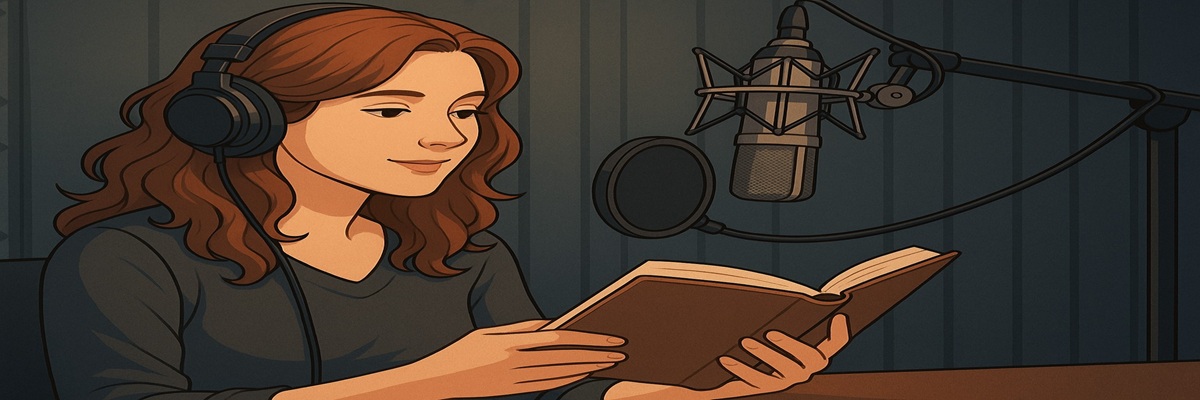Julia Whelan is not just a recognizable name in the audiobook world — she’s a defining voice in an industry that has grown from niche entertainment to a billion-dollar segment of publishing. With over 600 titles to her credit and collaborations with some of today’s most prominent authors, Whelan exemplifies the emotional precision and narrative discipline that separate professional narrators from automated alternatives.
In an era where AI-generated narration is increasingly used for cost-saving convenience, Whelan’s career stands as a reminder of the human skill behind exceptional storytelling. Her work illustrates not only the technical aspects of narration, but also the emotional intelligence and interpretive ability that a truly compelling performance requires.
From On-Camera Talent to Audio Storyteller
Julia Whelan began her career as an actress. She was a series regular on the drama Once and Again and appeared in a number of television and film projects throughout the early 2000s. Yet while many performers aim to transition from screen to stage, Whelan found a different path — one behind the microphone.
Her shift into audiobook narration was both deliberate and intuitive. With her training in drama and an MFA in creative writing, Whelan had a natural affinity for language and rhythm. She understood subtext, character arcs, and dialogue pacing — tools essential not only for screen acting, but also for delivering long-form, character-rich audiobooks.
She approached narration with the same rigor she would any performance-based medium: by dissecting the script, understanding tone, building internal logic between characters, and staying true to the author’s intention without overwhelming it with performative flair.
A Trusted Voice for Bestselling Authors
Whelan has narrated books for some of the most well-known names in contemporary fiction. Her collaborations with authors such as Kristin Hannah (The Nightingale), Gillian Flynn (Gone Girl), and Emily Henry (Book Lovers) have earned her both fan devotion and industry accolades.
One of her standout traits is the ability to modulate her delivery to match an author’s style. Whether narrating a high-stakes psychological thriller or a slow-burning romance, Whelan’s tone is always tuned to the story’s emotional register. She doesn’t simply “read” — she performs with restraint, nuance, and timing.
This control over tone and characterization becomes especially apparent in dual-narrator projects, where Whelan often carries the emotional weight of a female lead while harmonizing with a co-narrator portraying the male perspective. Her skill in switching between characters without exaggeration or confusion has helped raise the bar for narrators working in contemporary fiction.
Narration as Interpretation, Not Just Delivery
What sets Whelan apart from many competent narrators is her literary sensitivity. She approaches each book as a layered narrative, not just a linear story. Her understanding of metaphor, rhythm, and pacing allows her to deliver text with interpretive depth that often enhances the emotional clarity of the writing.
This interpretive skill is especially important when dealing with layered first-person narration or unreliable narrators — a structure commonly used in thrillers, romances, and character-driven fiction. Whelan can hint at subtext and emotional irony through tone alone, often catching nuances that might pass unnoticed in a silent reading experience.
For listeners, this creates a heightened level of immersion. For authors, it means entrusting their work to a voice actor who amplifies rather than overpowers their words.
A Respected Peer Among Narrators
While she’s a recognizable name to audiobook fans, Whelan is equally respected within the narration community. She is often invited to speak on industry panels and has contributed to discussions about the standards of professionalism in narration — including vocal health, performance preparation, and narrator-author collaboration.
She’s also a vocal advocate for preserving the craft of narration in an age of automation. As AI tools are increasingly marketed to publishers and indie authors, Whelan has emphasized the irreplaceable value of human intuition in performance. For her, narration is not a rote skill, but an interpretive art that demands empathy, discipline, and storytelling acumen.
On Writing and Directing Her Own Stories
In 2018, Whelan released My Oxford Year, a novel she both wrote and narrated. The project marked a convergence of her creative talents — screen acting, writing, and narration — and showcased her ability to craft a compelling story from both sides of the production process.
She has since directed other narrators, worked in casting, and expanded her footprint in the industry not only as a performer, but as a creative contributor with a deep understanding of the business behind audiobook production.
This makes her an increasingly influential figure in shaping how narration is discussed, taught, and valued — both as a performance discipline and a commercial service.
The Future of Narration in a Tech-Driven Industry
Whelan has publicly expressed concern about the impact of AI-generated narration on the profession. She has compared AI narration to fast food: widely available, but lacking the nutritional substance of human storytelling. In her view, narration is more than speech — it’s a form of authorship that requires judgment, restraint, and emotional resonance.
While technology will inevitably play a role in audiobook production moving forward, professionals like Whelan remind the industry that storytelling is not simply about reading words aloud. It’s about understanding meaning, tone, pacing, and the relationships between characters. Machines can mimic cadence, but not connection.
A Voice That Continues to Resonate
Julia Whelan’s contribution to audiobook narration is more than just prolific — it’s defining. She represents a class of narrators who bring literary training, emotional intelligence, and creative integrity to every project they undertake.
As the audiobook industry continues to grow and attract more diverse audiences, Whelan remains at the forefront, setting standards not just for performance, but for professionalism, empathy, and artistic interpretation.
Her voice, familiar to millions of listeners around the world, continues to elevate the audiobook from a reading alternative to an experience in its own right — one shaped by the nuance and depth only a human narrator can provide.
